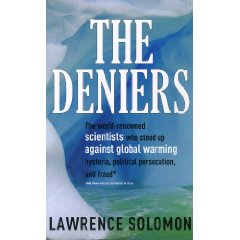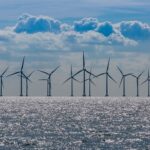Op 12 december schreef Martijn van Calmthout, chef wetenschapsredactie van De Volkskrant, een lang artikel over ‘Het politieke klimaat‘. Mijn uitgebreide reactie las je in dit artikel van 13 december op deze site. Prof. dr. ir. Hendrik Tennekes, oud-onderzoeksdirecteur van ons aller KNMI – jaren geleden uitgerangeerd vanwege zijn sceptische wetenschappelijke inzichten – wordt door Van Calmthout schaamteloos als zijnde politiek gemotiveerd op één hoop gegooid met een ras-VDD-er als Hans Labohm. Dit terwijl Tennekes, trouw PvdA-stemmer, zichzelf omschrijft als “een socialist van het oude stempel die ‘zijn’ partij lang niet links genoeg vindt”.
Leuk om zo door je kameraden te worden verraden. Dus klimt Prof. dr. ir. H. Tennekes, de oud-onderzoeksdirecteur van ons KNMI, en oud-voorzitter van het Scientific Advisory Committee van het European Centre for Medium-Range Weather Forecasts, in de pen. Prof. dr. ir. H. Tennekes schrijft een gevatte reactie op het fabelachtige verhaal van Van Calmthout. Wat doet De Volkskrant met het stuk van haar trouwste fan? Men laat het een week op de plank liggen en plaatst het vandaag op pagina 43 tussen de reacties van gewone burgers als zijnde een niemendalletje. De reactie van Prof. dr. ir. H. Tennekes, de oud-onderzoeksdirecteur van ons KNMI, internationaal zeer gerespecteerd als meteoroloog, en eervol opgenomen in Lawrence Solomon’s boek The Deniers, tussen de briefjes van Jan met de Pet.
Wij zijn meer dan trots de toestemming te hebben gekregen van Prof. dr. ir. H. Tennekes, de oud-onderzoeksdirecteur van ons KNMI, oud-voorzitter van het Scientific Advisory Committee van het European Centre for Medium-Range Weather Forecasts, zijn reactie vandaag ook hier integraal te mogen plaatsen.
Klimaatdossier
Ik ben blij dat Martijn van Calmthout eindelijk begrijpt dat het klimaatdossier niet een wetenschappelijk, maar een politiek dossier is (VK 12-12-2009). Zijn woede over de verstrengeling van wetenschap en politiek richt zich echter alleen tegen de zogenaamde klimaatsceptici, niet tegen de broeikasbroederschap die, gesteund door Al Gore, een klimaatcatastrofe in de markt wil zetten. Zowel links als rechts hebben verborgen agenda’s. Inderdaad hebben veel klimaatsceptici een blind geloof in de zegeningen van de vrije markt. Dat geldt echter niet voor alle wetenschappers die tot de sceptici worden gerekend, met name niet – Van Calmthout gebruikt mijn naam, vandaar – voor mijzelf. Ik ben een socialist van de oude stempel, heb altijd links gestemd, en vind de huidige PvdA lang niet links genoeg. Ik accepteer zonder veel moeite belastingverhoging wanneer solidariteit met werklozen, uitkeringstrekkers en hongerende inwoners van ontwikkelingslanden dat nodig maakt. Maar ik protesteer wanneer de klimaatwetenschap wordt misbruikt om politieke doeleinden inzake de herverdeling van welvaart door de achterdeur naar binnen te smokkelen. Ik zou graag meegaan met de broeikasbroederschap, ware het niet dat onze kennis van het klimaat lang niet goed genoeg is om betrouwbare uitspraken over de nabije toekomst te doen. De gedachte dat we het klimaat goed genoeg kennen om het naar onze hand te kunnen zetten, is volstrekt misplaatst. Op spookbeelden van een catastrofe kan geen beleid worden gebouwd. Veel actueler is de ellende die het wangedrag van bankiers wereldwijd heeft veroorzaakt. Weer is de onderkant van de samenleving de dupe. Mijn politieke prioriteit ligt niet bij het klimaatdossier.
Arnhem, Prof. dr. ir. H. Tennekes
Hieronder nog een sleuteltekst van Lawrence Solomon uit 2007 die aangeeft hoe gerenommeerd en belangrijk Tennekes wel niet is in de klimaatdiscussie. Vaderlands trots!
The limits of predictability
When Frans Nieuwstadt, a distinguished Dutch meteorologist, engineer, editor and professor, died in 2005, his obituary recounted seminal events in his accomplished life. Among the experiences worthy of mention: Nieuwstadt had studied under the celebrated professor, Henk Tennekes, and along with other colleagues had been instrumental in convincing Tennekes to return to Europe in 1978 to become director of research at the Royal Netherlands Meteorological Institute and later chairman of the august Scientific Advisory Committee of the European Centre for Medium-Range Weather Forecasts.
Henk Tennekes, in ways both personal and professional, has touched an extraordinary number of lives in his own distinguished career, among academics and laymen alike. He is loved for his popular 1997 book, The Simple Science of Flight From Insects to Jumbo Jets, and for his scholarly 1972 work, A First Course in Turbulence, a classic that logs more than 2,000 citations on Google Scholar. His provocative 1986 speech, “No Forecast Is Complete Without A Forecast of Forecast Skill,” led to the now-common discipline of “ensemble forecasting” and spurred “multi-model forecasting.” Scientists today continue to wrestle with the fundamental critiques that he first presented.
Tennekes became more than an inspiration for his students and a model for other scientists, however. He also became an object lesson in the limits of scientific inquiry. Because his critiques of climate science ran afoul of the orthodoxy required by the Royal Netherlands Meteorological Institute, he was forced to leave. Lesser scientists, seeing that even a man of Tennekes’s reputation was not free to voice dissent, learned their lesson. Ever since, most scientists who harbour doubts about climate science bite their tongues and keep their heads down.
Tennekes, more than any other individual, challenged the models that climate scientists were constructing, saying models could never replicate the complexity of the real world. What was needed was a different approach to science, one that recognized inherent limits in such scientific tools and aimed less to regulate the environment.
In a landmark speech to the American Meteorological Society in 1986, he argued that meteorology was poised to be the first of the post- Newtonian sciences because it was “at odds with the mainstream of the scientific enterprise of the last 300 years. One goal of science is to control nature, but we know we cannot control the weather. The goal of science is prediction, but we stand in front of the limits of predictability.”
Meteorology, in other words, would be the first scientific discipline to hit this brick wall. As Tennekes argued, modern theory “unequivocally predicts that no amount of improvement in the quality of the observation network or in the power of computers will improve the average useful forecast range by more than a few days.”
Since Tennekes’ speech, a host of scientists have sought to extend the bounds of modelling. They have seen success, but only on the scale Tennekes predicted.
In a paper presented in 2003, a team of European scientists detailed advances in modelling science. “Since the day, almost 20 years ago, in which Henk Tennekes stated … that ‘no forecast is complete without a forecast of the forecast skill,’ the demand for numerical forecasting tools … has been ever increasing,” they said, explaining efforts to make modelling reliable beyond a three- to four-day period. Thanks to the intense efforts of a new generation of climate modellers, modelling capability has advanced in some instances by 12 to 36 hours, in others by several days. To extend the bounds further, the paper announced a major new research initiative, designed to bring the forecasting discipline to the 120-hour range.
Climate modelling is the basis of forecasts of climate change. Yet this modelling, Tennekes believes, has little utility, and “there is no chance at all that the physical sciences can produce a universally accepted scientific basis for policy measures concerning climate change.” Moreover, he states: “There exists no sound theoretical framework for climate predictability studies.”
Not surprisingly, Tennekes abhors the dogma that he feels characterizes the climate-change establishment, and the untoward role of climate science in public-policy making. “We only understand 10% of the climate issue. That is not enough to wreck the world economy with Kyoto-like measures.”
Lawrence Solomon@nextcity.com
Bron: Canada.com







Hoi Hajo, in het stuk staat er een paragraaf dubbel [When Fred … Forecasts.].
Hier een link naar de hele "Deniers" serie van Lawrence Solomon:
http://network.nationalpost.com/np/blogs/fpcommen…
http://www.desmogblog.com/lawrence-solomons-denie…
Geen enkele van de geciteerde wetenschappers is tegen GW ;)
http://digg.com/environment/Global_Warming_Denier…
http://www2.canada.com/components/print.aspx?id=1…
[…]
You won't find that quote in within the pages of Lawrence Solomon's new book, The Deniers: The World-Renowned Scientists Who Stood Up Against Global Warming Hysteria, Political Persecution, and Fraud (and those who are too fearful to do so).
Nope, as the world's longest book title suggests, Solomon is not the least interested in considering a climate consensus — and if that means that he has to cherry-pick quotes, misrepresent data and cut off graphs before their curves become inconvenient, well, Solomon — and Mark Milke, who reviewed the book on these pages last week — seem not to mind.
Solomon at least admits that the whole exercise is a parlour game, a work of sophistry.
He reports on page 6 that his interest in climate change denial began because he was trying to impress some visiting Chinese environmentalists with the vigour of the North American environmental debate.
With the Chinese looking on, Solomon challenged a friend to "name three climate-change areas that he felt were settled. … I told him if he identified the areas of expertise, I would find a credible dissenting scientist in each."
The problem is that Solomon's "deniers" don't actually deny climate change. They quibble about the details.
[…]
{…}
Solomon even says so. He says that while reflecting on his own research, "I … noticed something striking about my growing cast of deniers. None of them were deniers." (My emphasis.)
{…}
;)
http://www.desmogblog.com/lawrence-solomons-denie…
[…]
The problem, then and still, is that nobody in Solomon's overheated text actually denies that humans are causing climate change. He admits as much on Page 45 of his book, saying:
"As these rather dramatic reversals for the doomsday view mounted, however, I also noticed something striking about my growing cast of deniers.
"None of them were deniers."
That's a little point that Solomon never seems to mention on the speaker circuit. At least, in the radio and television interviews I've heard – and in his endless series of quibbling trivia that he has written in the Canadian business flyer the National Post – he never seems to say something forthrightly honest like: "none of the people in my book are deniers, really. They just argue about tiny bits of science that even the IPCC admits remain unsettled."
Neither does Solomon acknowledge the complaints that he has received (and rebuffed) from legitimate scientists whose work he has misrepresented.
He just sits, smiling for the camera, while someone introduces him as the author of a whole book and series on scientists who deny climate change – as if that were actually true.
Solomon's next public "appearance" as a denier expert comes in an open conference call scheduled by the U.S. Chamber of Commerce on Tuesday, Dec. 2, 2008 at 10 a.m. (presumably that's Inside-the-Beltway Standard Time).
Turn on, tune in and don't hold your breath waiting for Larry Solomon to acknowledge what he so surprisingly admitted in his own text: that his book title, which implies fraud, is actually an example of fraud, and one that's working out very well for this suddenly more-famous author.
[…]
Nog eentje!!
http://www.desmogblog.com/national-post-ducks-cor…
————–
SOLAR ACTIVITY AND GLOBAL WARMING
The article by Lawrence Solomon, which portrays me as a denier of global warming, is a slanderous fabrication. I have always maintained that the current episode of warming that we are experiencing is caused by anthropogenic greenhouse gases, and that global temperatures will rise much further unless steps are taken to halt the burning of fossil fuel. Compared to these effects, the influence of variations in solar magnetic activity is unimportant, however interesting it may be to astrophysicists like me.
For further details see the Press Release on the University of Cambridge website
Nigel Weiss
————–
Cool, LOL!!!
In het voorwoord van The Deniers schrijft Solomon: Ik heb vaak de vraag gekregen waarom ik bij de titel van de serie en het boek de terminologie van de "vijand" heb gebruikt. Veel van de wetenschappers in dit boek haten de term en ontkennen dat die titel op hen van toepassing is.
Zijn antwoord: Lees de interviews en oordeel zelf.
Gisteren schreef Solomon een stukje over William Connolley,een "denier" van de MWP en "gatekeeper" van Wikipedia.
How Wikipedia’s green doctor rewrote 5,428 climate articles
http://www.nationalpost.com/m/blog.html?b=fullcom…